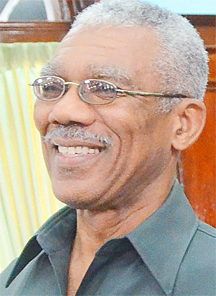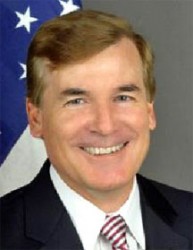The US Ambassador to Guyana and a USAID team on Thursday held discussions with Opposition Leader David Granger on a $300M democracy project here and heard complaints about ministerial manipulation of the local government system among others.
A release yesterday from A Partnership for National Unity said that Granger met at the Office of the Leader of the Opposition with Ambassador D. Brent Hardt and the USAID team responsible for the project.
According to the release, Hardt said that this new US$1.5M USAID project has the following components: Strengthening the role and effectiveness of Parliament; public education and information for Local Government; and Engagement and involvement of young people in the political system.
Granger was accompanied by the following Shadow Ministers for Agriculture, Natural Resources and the Environment, Dr. Rupert Roopnaraine, MP; Local Government and Regional Development, Ronald Bulkan, MP; Finance and Development, Carl Greenidge, MP; and Legal Affairs, Attorney General and Labour, Basil Williams, MP, along with Policy Adviser, E. Lance Carberry.

The US Ambassador was accompanied by Humberto A. Collado, Programme Officer, Latin America and the Caribbean; Michael Fraser, Political and Economic Chief, US Embassy; Michael Murphy, IRI Project Adviser; and Cloe Noble, Programme Management Specialist, USAID.
The release said that there was extensive discussion of critical issues of governance.
It cited these as “The need for strengthening of the National Assembly to ensure that it is equipped to effectively ensure that the Executive is accountable to the People through their representatives in the National Assembly; technical and analytical support for the work of the National Assembly, such as the establishment of a Budget Office, the provision of the capacity to provide Legislative Drafting assistance for the Opposition, professional research support for the work of Committees, etc.; the provision of adequate resources to ensure the effective functioning of the Office of the Leader of
the Opposition; the challenges to part-time MPs with the increasing demands of the Committee system; the need to guarantee the independence and autonomy of Constitu-tional Offices and institutions; the implications of the proliferation of “acting” appointments; the status of Local Government reform as a precondition for the holding of Local Government Elections; the removal of the heavy hand of Ministerial manipulation of the Local Government system; the need for comprehensive Public Education programmes for ensuring that the new Local Government system is understood; the need for “civic” education for encouraging young people to become actively involved in the political system; the challenge of independent “funding” for the Local Govern-ment system; and the implications of the refusal of the President to give his Assent to Opposition Bills.”
The release added that it was evident that the new project “could make a valuable contribution for advancing the evolution of a truly democratic culture in Guyana.”
Contacted for a reaction from government, Attorney General Anil Nandlall said yesterday that because of the wide range of issues dealt with at the meeting, he believes that it would require deliberation on behalf of the party and Cabinet.

“I am unprepared to respond to these issues without the guidance of my party and the Cabinet,” Nandlall said.
It is unclear how far the project planning has proceeded and whether the government or ruling PPP/C has had any input in it. Observers note that two of the project’s areas of concentration: the role and effectiveness of Parliament and public education for local government are currently matters of contention between the government and the opposition. The effectiveness and role of Parliament, in particular, has focused debate on the use of the opposition’s one-seat majority and the President’s unwillingness to assent to two bills passed with this razor thin majority. It has not been stated what the project intends to achieve in this area. The opposition-led Parliament recently expressed the need for an Independent parliamentary counsel and for drafting assistance for bills.
On the local government front, the government and the opposition are presently locked in deliberations at the level of a select committee of Parliament on a suite of bills that will significantly change the framework under which elections are held and local government is run. It is unclear whether these deliberations will conclude in time to allow local government elections – which the western missions have been pressing for – to be held before the end of the year. Local government elections were last held here in 1994.





